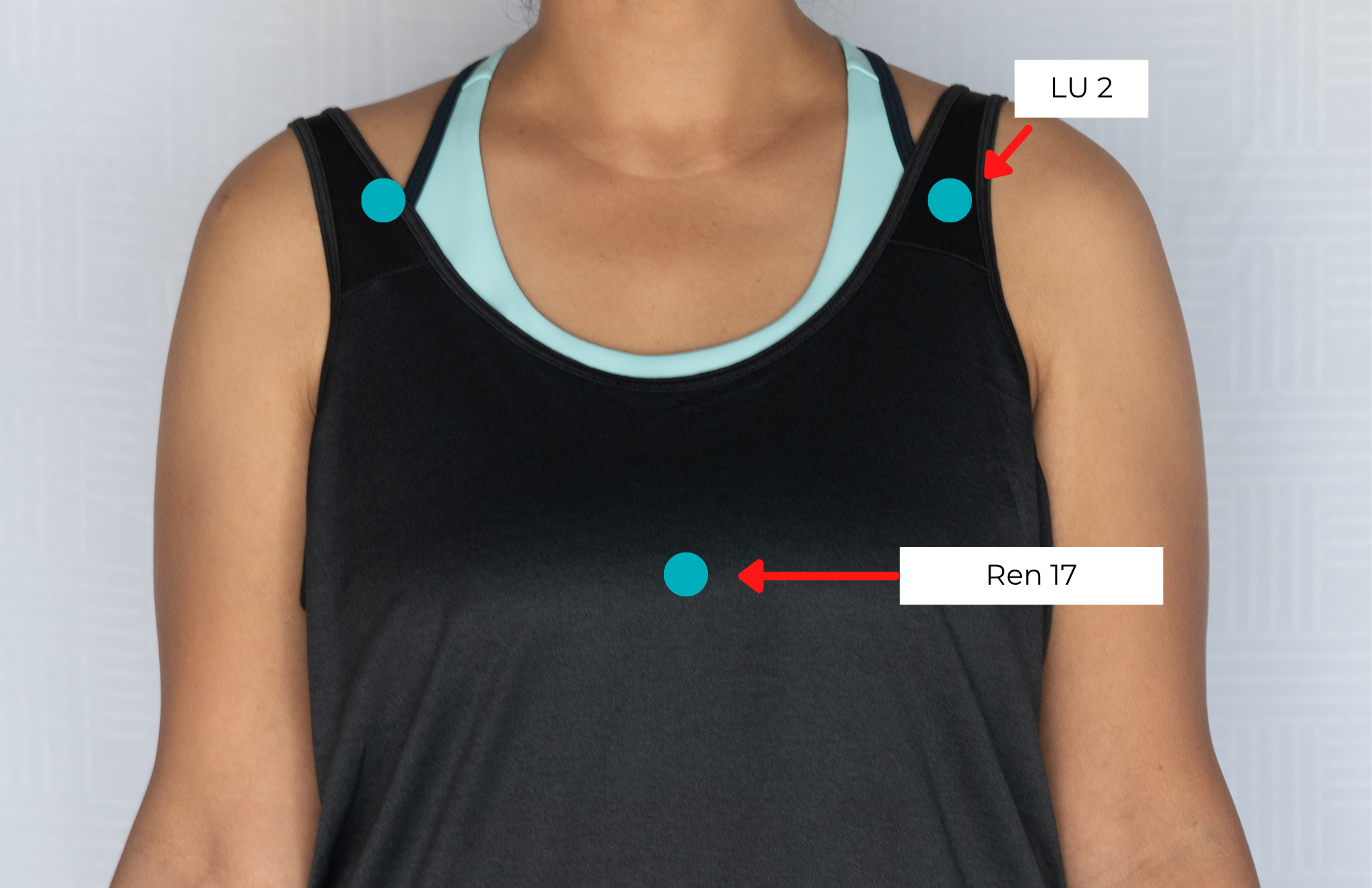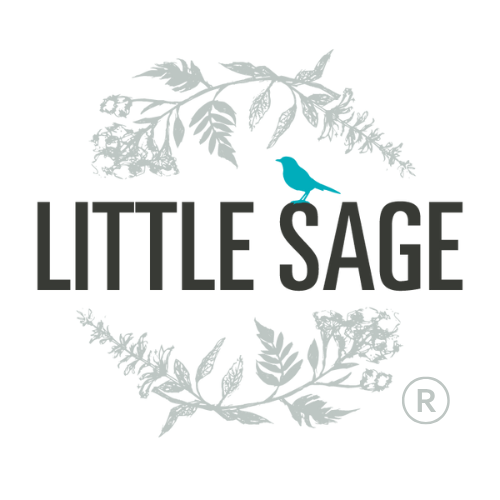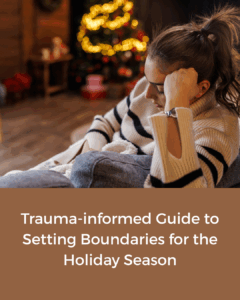For some people, the holidays are not simply a time of joy. They are a landscape of memory. A terrain where grief, longing, obligation, and an ache can live right beside love and celebration.
And so, before the season gathers its momentum, I invite you to pause.
To ask the body what it needs.
To remember that energetic boundaries are a medicine—one that we did not always receive.
The Holidays Hold Many Truths
The cultural messages around this season often insist that it’s a time of uncomplicated gratitude, harmony, and abundance.
But for those living with chronic symptoms like pain, fatigue, and overwhelm, the holidays can be difficult to navigate. Even the anticipation of family gatherings—or the absence of them—can stir old emotions, unresolved dynamics, and body memories.
And if you carry trauma, this season can feel especially tender. For many BIPOC communities, the holidays also hold a layered meaning, shaped by the legacy of colonization and the ongoing harm toward Native peoples. It’s a time that can hold both longing and complexity, celebration and grief.
The fall season in Traditional East Asian Medicine belongs to the Metal element, the domain of the Lungs and Large Intestine, where we carry grief and sadness. It’s also the organ to work with if we want to release what no longer serves us, and refine what is essential. We can breathe in what sustains us. We can let go of what weighs down our spirit. The season itself invites boundaries.
And as we move toward winter, we enter the realm of the Water element—the Kidneys, the home of fear, wisdom, memory, and Jing, our ancestral essence. This is the season of deep internal listening. Of holding energy close. Of conservation rather than performance.
Your body knows this rhythm. Even if you have been taught by society and our upbringing to ignore it.
Why Energetic Boundaries Are Not a Luxury—They Are Survival
If you live with chronic illness, pain, autoimmune symptoms, trauma, or ongoing exhaustion, you already know that the holidays can leave you depleted for weeks or months. Social interaction, travel, sensory input, emotional labor, and family dynamics ask a great deal from the nervous system.
Energetic boundaries are not about shutting others out. They are about staying in relationship to yourself. They are how you protect the parts of you that are healing. They are a refusal to abandon the inner knowing—what I call your Little Sage™—that whispers what your body can and cannot hold.
Boundary Work Begins in the Body
Before we can set boundaries with clarity and confidence, we need to feel safety inside the body. Boundaries aren’t only decisions we make with the mind—they’re sensations, signals, and instincts that arise from a regulated nervous system.
One way to support this internal safety is through trauma-informed Qigong and gentle acupressure. These practices help the body soften, ground, and recognize its own limits.
Here are a few simple points that can help you reconnect with your center as you practice honoring your boundaries this season.

Ren 17 — Tan Zhong
Location:
Ren 17 sits at the center of the chest, right between the nipples at the level of the heart space.
Meaning & Function:
Ren Zhong is often called the “Heart Protector” point. In Traditional East Asian Medicine, it’s connected to the Pericardium—the energetic shield that surrounds the heart. Gently working with this point can help soften tightness in the chest, regulate breath, and create a sense of inner safety. Activating this point helps promote emotional and mental well-being.
How it supports boundaries:
When the heart feels guarded without being closed, it becomes easier to speak your truth, hold your center, and protect your emotional space without shutting down. This point helps the body feel safe enough to set boundaries with clarity and compassion.
Lung 2 — Yúnmén - Cloud Gate
Location:
LU 2 is located just below the outer collarbone, in the soft, slightly hollow area near the shoulder.
Meaning & Function:
Yúnmén translates to “Cloud Gate.” It’s part of the Lung channel, which in Traditional East Asian Medicine is connected to letting go—especially of grief, overwhelm, and the weight we carry on the chest.
How it supports boundaries:
When we’re holding unprocessed grief or emotional heaviness, it becomes harder to say what we need or to release what doesn’t belong to us. Activating Cloud Gate helps create more spaciousness in the chest so the breath can deepen, the voice can open, and the body can let go of what it’s been carrying.
The Three Layers of Holiday Boundaries
A trauma-informed approach recognizes that boundaries are not only spoken—they are energetic, behavioral, relational, and somatic. Below are three layers you may consider tending this season.
1) Nervous System Boundaries
For when your body needs pacing, slowness, or space
Examples:
- Leaving events early or not attending at all.
- Scheduling recovery time after gatherings.
- Choosing one event instead of many.
- Not explaining your symptoms to people who won’t understand.
- Eating, resting, or taking medication on your own schedule even if others disapprove.
A helpful inquiry:
What helps my breath stay soft and steady?
2) Relational Boundaries
For when conversations, expectations, or family dynamics feel unsafe.
This might include:
- Stepping back from conversations that begin to feel too activating or heavy for your body in the moment, trusting the signals that tell you when your capacity has been reached.
- Keeping physical and emotional distance from people who drain or disregard you.
- Redefining what togetherness means for you this year.
A helpful inquiry:
Who in my life can I be my whole self with—and who requires protection?
3) Ancestral & Energetic Boundaries
For when generational pain, projections, or cultural pressure surface
This might look like:
- Not taking on the role of peacemaker, translator, or emotional buffer.
- Letting go of the responsibility to “fix the family.”
- Closing the door to narratives that belittle your healing work or spiritual path.
- Creating a private ritual before or after gatherings to release what isn’t yours.
A helpful inquiry:
What energy ends with me? What energy continues through me?
Boundary Scripts for Sensitive Seasons
You do not owe long explanations. Here are offerings of language you may adapt:
- “I don’t have the capacity for that this year.”
- “I’m choosing a quieter season. Thank you for understanding.”
- “I’ve already made commitments that support my health, so I won’t be attending.”
- “I’m not available for that topic, but we can talk about something else.”
- “I’m going to step away and take a break for my body.”
- “I appreciate the invitation, and I’m honoring my limits this time.”
Say them out loud. Let your mouth learn the shape of protection.
When Guilt or Grief Arises
You may feel guilt. You may feel fear. You may feel the ache of old longing. This is normal. Boundaries are vulnerable when we were raised to survive without them.
If you notice self-doubt, ask yourself:
- Who taught me that my needs were a burden?
- Who benefits when I ignore myself?
Your grief is not a sign that you are doing something wrong.
It may be a sign that you are doing something you never had the safety to do.


